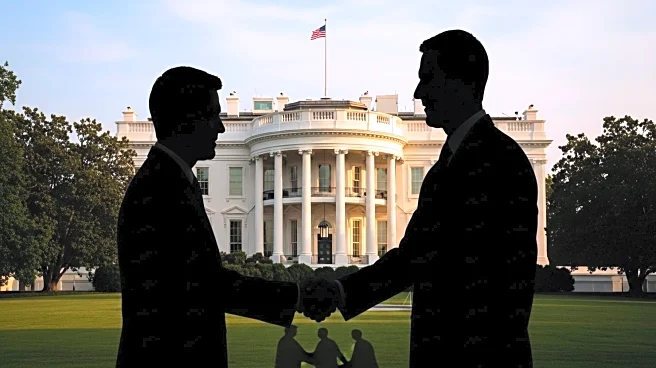What's Happening?
Prime Minister Benjamin Netanyahu recently held a private meeting with Ali Al Thawadi, a senior Qatari official, at the White House. This meeting followed Netanyahu's apology to Qatar's Prime Minister Mohammed bin Abdulrahman Al Thani for a deadly Israeli strike in Doha. The meeting, which included discussions on Gaza and efforts to rebuild ties between Israel and Qatar, was unusual given the lack of formal diplomatic relations between the two nations. Al Thawadi, known for his involvement in sensitive Qatari dealings, has faced allegations of corruption, including the transfer of 'suitcases of cash' to Gaza. The meeting was part of broader efforts to address issues related to Hamas and regional stability.
Why It's Important?
The meeting between Netanyahu and Al Thawadi is significant as it highlights ongoing diplomatic maneuvers in the Middle East, particularly concerning Israel's relations with Qatar. The discussions on Gaza and Hamas are crucial given the region's instability and the humanitarian challenges faced by Palestinians. The involvement of a Qatari official known for controversial dealings underscores the complex nature of Middle Eastern diplomacy. Additionally, the U.S. administration's security guarantee to Qatar reflects the strategic importance of Qatar in U.S. foreign policy, potentially affecting regional alliances and security dynamics.
What's Next?
Following the meeting, the Trump administration issued an executive order providing Qatar with a security guarantee, indicating a commitment to protect Qatar's sovereignty. This move may lead to increased diplomatic engagement between the U.S., Qatar, and Israel, focusing on regional security and economic cooperation. The ongoing dialogue between Netanyahu and Qatari officials could pave the way for future negotiations on Gaza and broader Middle Eastern peace efforts. Stakeholders, including political leaders and international organizations, will likely monitor these developments closely.
Beyond the Headlines
The meeting and subsequent U.S. security guarantee to Qatar may have long-term implications for Middle Eastern geopolitics. It could influence Qatar's role in regional conflicts and its relations with other Gulf states. The focus on Gaza and Hamas highlights the persistent challenges in achieving peace and stability in the region. The involvement of figures like Al Thawadi, with alleged ties to corruption, raises ethical questions about the nature of diplomatic negotiations and the influence of money in international relations.










